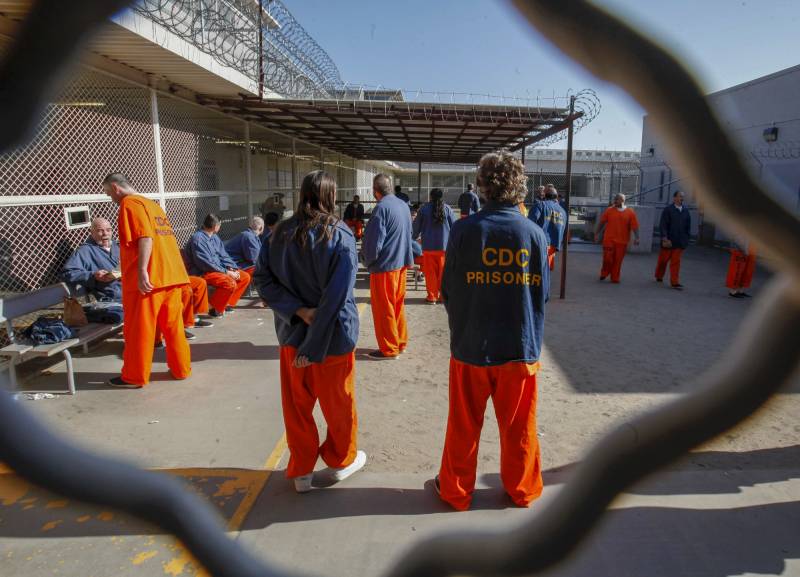Listen to this special episode of Ear Hustle in honor of Pride Month.
More of California's Imprisoned Are Applying for Gender-Affirming Health Care

More of California's Imprisoned Are Applying for Gender-Affirming Health Care
The number of incarcerated Californians requesting gender-affirming health care more than doubled last year, and the state’s corrections agency expects the trend to continue even as the overall population of imprisoned people in California is projected to decline.
The estimate comes from budget documents detailing the agency’s responsibilities for two groundbreaking policies the state adopted over the last seven years.
One, in 2017, made California the first state to set standards that would grant gender-affirmation surgery to incarcerated people in state prison. It followed the state’s approval of surgery for a transgender woman serving a life sentence. She was later transferred to a women’s prison.
The other, a 2021 law signed by Gov. Gavin Newsom, requires that every person upon entering prison be asked gender-specific questions to determine whether they should be housed in a men’s or women’s facility.
Since the changes took effect, the California Department of Corrections and Rehabilitation found that the number of incarcerated transgender, intersex and nonbinary people consistently grew each year, rising to 1,617 last year. That’s a 234% increase over 2017, according to the documents.
“The vulnerable, transgender and transgender diverse population in CDCR has grown and continues to grow and there are enduring needs that need to be met,” Trisha Wallis, a department senior psychologist who specializes in gender health care, said during a budget committee hearing in March.
The agency this year sought a slight boost in funding — $2.2 million — to provide the mandated care. The agency’s request was not controversial and moved through the Legislature without pushback this spring. Budget negotiations between Gov. Newsom and the Legislature are expected to conclude this week.
Wallis at the hearing said the program was originally meant to “address equitable access” to safe and optimal gender-affirming care, but she acknowledged that staff shortages led to treatment backlogs.
Backlog grows for gender-affirming care
As of December, 20 incarcerated people since 2017 had received gender-affirming surgery. Another 150 surgeries had been approved, but not completed, according to the budget documents.
In the 2021-22 California government budget year, 270 incarcerated people requested gender-affirming surgeries — up from 99 the previous year.
The state projects 348 incarcerated people will request gender-affirming treatment this year, and 462 next year. The corrections agency says its staff can evaluate no more than three requests each week.
The agency also has received over 364 housing transfer requests since 2021. Only 35 of those were approved and sent to the Central California Women’s Facility in Chowchilla.
Advocates for transgender and nonbinary incarcerated people have urged the state to move faster in providing the surgeries and evaluating other incarcerated people’s requests to transfer to facilities that better suit their needs.
Some of them criticized the agency’s budget request, arguing the state’s $15 billion-a-year prison system already had plenty of money to carry out the policies.
“It’s ridiculous. Two million dollars for stuff they should already be doing?” said Alex Binsfield, a policy analyst with TGI Justice Project, a San Francisco nonprofit that advocates for incarcerated transgender people. “I don’t think pumping any more money into CDCR is going to fix health care there.”
Transgender advocates also are on guard for signs that the state is refusing transfers for incarcerated people who identify as transgender but who have not received gender-affirming medical care.
“Ultimately the housing question should not be a medical question,” said Jen Orthwein, a psychologist who previously provided treatment to transgender incarcerated people in prisons across California.
Terri Hardy, spokesperson for the California Department of Corrections and Rehabilitation, said those fears are unfounded.
“Incarcerated people are not required to have gender-affirming surgery in order to transfer to an institution consistent with their gender identity,” Hardy wrote in an email to CalMatters.
Lawsuit challenges California prison transfers
Outside of the Capitol, some conservative-leaning and feminist groups have opposed the prison agency’s gender-affirming policies.
The Women’s Liberation Front, a feminist advocacy group based in Washington, D.C., sued the state in 2021 to halt certain transfers to the state’s women’s prison in Chowchilla. It argued the transfers put incarcerated females at greater risk of violence and sexual assault. The lawsuit is playing out in the U.S. Eastern District Court of California.
“The reality that men and women are factually, materially, immutably different, in ways that disadvantage women and necessitate attention to women’s unique needs, supports protection of incarcerated women by providing women-only correctional facilities,” the lawsuit reads.
The Transgender Law Center and the American Civil Liberties Union filed a brief challenging that suit. The two liberal organizations contend the 2021 law allowing prison transfers protects vulnerable incarcerated transgender people.
Several states have followed California in adopting gender-affirming policies for incarcerated people. Massachusetts and Connecticut allow incarcerated people to be transferred to facilities according to their chosen gender identity. New Jersey, New York City and Rhode Island also require that incarcerated people be housed at facilities appropriate to their gender.
Orthwein, the psychologist, urged the state to accommodate more care.
“There should be no difference to their treatment than that of cisgender people,” Orthwein said. “They shouldn’t have to jump through a number of barriers and be poked and prodded for housing.”

